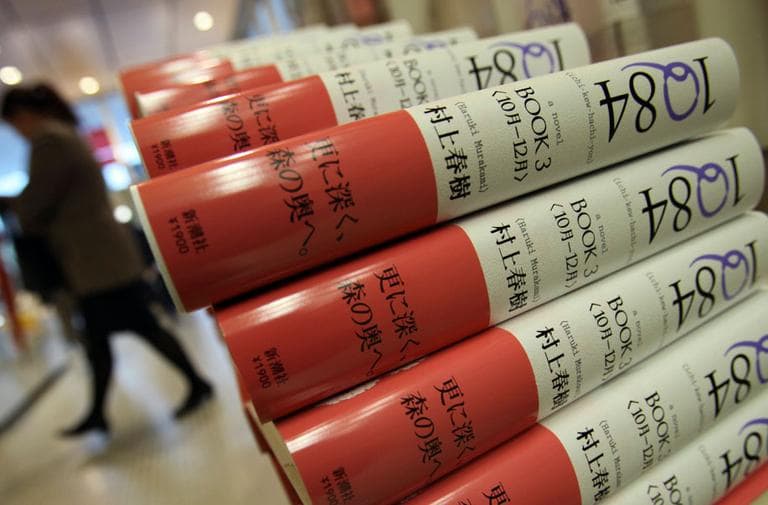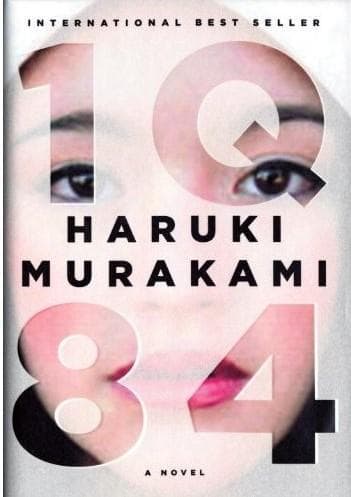Advertisement
Murakami Uses Bach, The Beatles In Storytelling
Resume
Music plays a significant and recurring role in all of Japanese author Haruki Murakami's novels. That's especially true in his new 900+ page epic “1Q84.’’
Here and Now critic-at-large Ed Siegel joins us to talk about the book and how Murakami weaves music references throughout his work. Sometimes the songs advance the story, sometimes they’re just entertaining discussions about music.
By Ed Siegel

Haruki Murakami’s latest novel “1Q84” would seem to be his epic statement, considering its length, over 900 pages, and its allusion to George Orwell’s iconic “1984.” On the other hand, it really isn’t all that different from his other fiction – just longer.
One of the things that all great writers do is create a world of their own, one in which you want to spend time, take in all the sights and sounds-- and Murakami’s world is as unique and welcoming as they come. He’s really developed his own form of magical realism. He creates worlds that are mirror images of ours, though they’re filled with talking animals, zen mysticism, scientific theory, hot sex, and a never-ending loop of great music of all genres.
There are two main characters in the new book. The first is Aomame — a 30-year-old personal fitness trainer in Tokyo who, when we meet her, is stuck in traffic. She’s in her minidress and high heels, on her way to give a tony client a massage. She also happens to be a hit woman, in the pay of a wealthy dowager, who offs men who commit domestic violence against women.
Music is the key to much of what happens in the book. As the story begins, she hears Leos Janacek’s “Sinfonietta.” The music transports her into another world, where she starts thinking about her one true love, our other main character Tengo, even though she hasn’t seen him since they were 10 years old. For all his modernity, Murakami is really a romantic.
So Aomame gets out of the cab, climbs down a hidden staircase and notices that the world she’s in has a couple of different aspects to it, chief among them is that there are now two moons in the sky. The song that often accompanies these sightings is "It's Only a Paper Moon," which grows in significance throughout the novel.
When Murakami graduated from college he bought a jazz bar and he apparently has tens of thousands of records, so he loves to introduce music into the story. Sometimes it advances the story, sometimes it's just entertaining. As Tengo is lying in bed with his girlfriend, she’s introducing him to Louis Armstrong’s “Atlanta Blues” and explaining the contribution from clarinetist, Barney Bigard.
“Listen to that! Amazing – that first, long wail like a little child’s cry! What is it – surprise? Overflowing joy? An appeal for happiness? It turns into a joyful sigh and weaves its way through a beautiful river of sound until it’s smoothly absorbed into some perfect, unknowable place. There! Listen! Nobody else can play such thrilling solos. Jimmy Noone, Sidney Bechet, Pee Wee Russell, Benny Goodman: they’re all great clarinetists, but none of them can create such perfectly sculptured works of art.”
Tengo is a writer who’s been hired to polish up a 17-year-old girl’s very strange, otherworldly first novel, which also has two moons. He takes Fuka-Eri under his wing (and they become lovers) and if that relationship gives you pause — the age of consent in Japan is 20 — suspend your distaste for just a minute. This sexual encounter isn’t exactly innocent, but it serves a purpose that I don’t think many readers will object to by the book’s end. It involves our old friend, Aomame, who at this point is desperately looking for her long-lost 10-year-old pal, Tengo, and he for her.
But going back to the 17-year-old Fuka-Eri. Many of the characters in the book are recovering from their parents’ involvement in religious cults. Religion is at the heart of this epic. There’s no Big Brother in this 1984, but there is an unsettling sense that religious leaders, particularly fundamentalists of all stripes, have gotten too powerful and have way too much influence.
As the leader of one cult says in the book, “Most people are not looking for provable truths. As you said, truth is often accompanied by intense pain, and almost no one is looking for painful truths. What people need is beautiful, comforting stories that make them feel as if their lives have some meaning. Which is where religion comes from.”
But there’s also some lovely writing about religion, including on Bach’s “St. Matthew’s Passion." The cult leader’s thoughts on the masses and religion reflect those of “The Grand Inquisitor” in Dostoevsky’s “Brothers Karamazov.” So even though Murakami is trying to get beyond simple questions of good and evil, he’s saying that religions that provide easy answers, that take the Bible literally, are highly suspect; religions that exalt the mystery of the universe – remember those two moons – are positive forces. As Yip Harburg and Billy Rose say in “It’s Only a Paper Moon, “It’s a Barnum and Bailey world, just as phony as it could be. But it wouldn’t be make-believe if you believed in me.” Murakami is saying that life isn't worth much without love — or without great music and great writing.
So more than religion it’s love and art that have the power to transform Murakami’s worlds. And I have to say that even though I only see one moon in the sky, it looks a little different these days.
Guest:
- Ed Siegel, Here & Now critic-at-large
This segment aired on October 27, 2011.